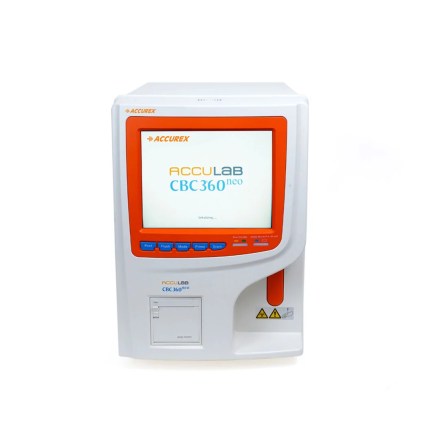- Your cart is empty
- Continue Shopping
Choosing the Right Automated Hematology Analyzer for Your Lab: A Comprehensive Guide

In today’s healthcare landscape, accurate and timely laboratory results are crucial for effective patient care. Automated hematology analyzers play a vital role in achieving this, streamlining workflows and delivering reliable blood analysis. However with diverse options available, selecting the right machine for your lab can be daunting. This guide navigates you through key factors to consider, ensuring you choose the optimal analyzer for your unique needs.
1. Assess Your Laboratory’s Demands:

- Sample Volume: Consider your daily or hourly sample load. High-throughput labs require analyzers capable of handling hundreds of samples efficiently, while smaller labs may opt for lower-volume models.
- Test Menu: Determine the specific tests you need, like complete blood counts (CBCs), white blood cell differentials, reticulocyte counts, and more. Specialized areas like hematology-oncology might require features tailored to specific patient populations.
- Automation Level: Evaluate your desired automation level, ranging from basic sample loading to advanced features like auto-dilution and flagging abnormalities.
2. Technology and Performance:

- Measurement Technology: Understand the advantages and limitations of different technologies like impedance, flow cytometry, and Coulter counting in terms of accuracy, precision, and speed. Select an analyzer that aligns with your required performance standards.
- Precision and Accuracy: Choose a machine with established performance data, meeting your specific requirements for precision and accuracy for the tests you conduct.
- Data Management and Integration: Ensure seamless integration with your Laboratory (Information System (LIS) for efficient data transfer and reporting.
- Dual Chamber: The dual-chamber design is a key feature that contributes to the accuracy and reliability of complete blood count (CBC) analysis.
- Faster processing: With dedicated chambers for each cell type, the analyzer can process samples more efficiently, potentially increasing throughput and reducing turnaround times.
- 3-Part CBC: If a 3-part CBC (white blood cell differential) is crucial, ensure the analyzer provides detailed information on different white blood cell types.
- Platelet Histogram: For in-depth analysis of platelet size and distribution, consider analyzers offering platelet histograms.
3. Budget and Cost-Effectiveness:

- Initial Investment: Analyze the initial purchase price, considering the features and capabilities offered by different models.
- Operating Costs: Factor in the cost of reagents, consumables, maintenance, and service contracts.
- Return on Investment (ROI): Evaluate the long-term benefits like improved efficiency, reduced labour costs, and faster turnaround times to assess the analyzer’s value proposition.
4. Usability and Support:

- Ease of Use: Ensure the analyzer has user-friendly software and clear instructions for your laboratory staff.
- Simplifies operation for staff of all skill levels.
- Large touchscreen display
- User-friendly software:
- Automated features:
- On-screen instructions and prompts:
- Multilingual interface
- Training and Support: Choose a manufacturer offering comprehensive training and readily available technical support to minimize downtime and ensure smooth operation.
- Service and Maintenance: Opt for an analyzer with a good warranty and consider service contracts for preventive maintenance and repairs. Ensure the availability of qualified technicians and replacement parts for prompt resolutions.
By carefully evaluating these factors and aligning them with your specific laboratory needs and budget, you can confidently choose an automated hematology analyzer that optimizes your workflow, delivers accurate results, and ultimately enhances patient care. Remember, consulting with healthcare professionals and exploring various available options is highly recommended before making your final decision.
Conclusion:

Choosing the right automated hematology analyzer is a critical investment. Consider your lab’s workload, test needs, budget, and desired automation level. Technology, accuracy, data management, and ease of use are crucial factors. Check out the Accurex Acculab CBC 360 Neo the Hematology Analyzer can be effectively used for Walk-away Operations. This high-throughput analyzer offers comprehensive testing, advanced automation, and user-friendly software, addressing diverse lab needs. Backed by strong performance data, integration options, and dedicated support, the Acculab CBC 360 Neo empowers labs to deliver accurate and timely results, ultimately contributing to improved patient care.



